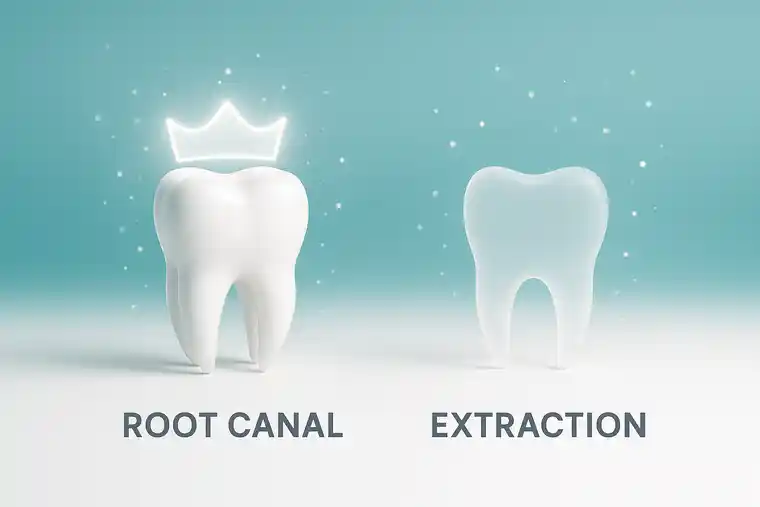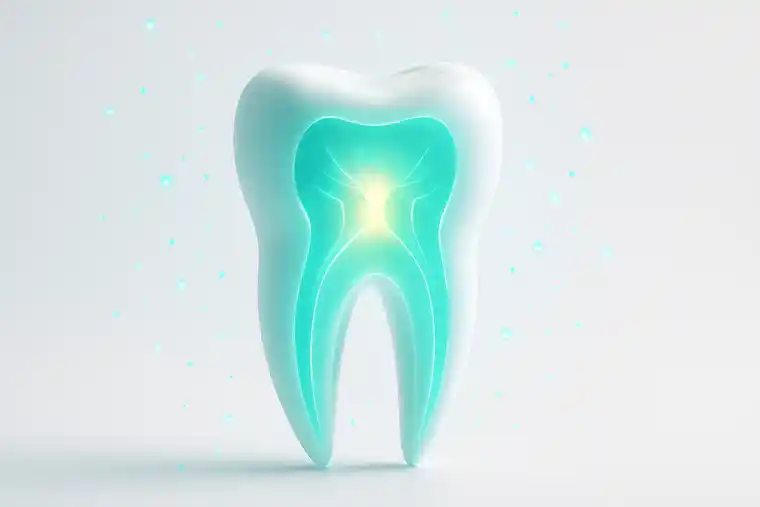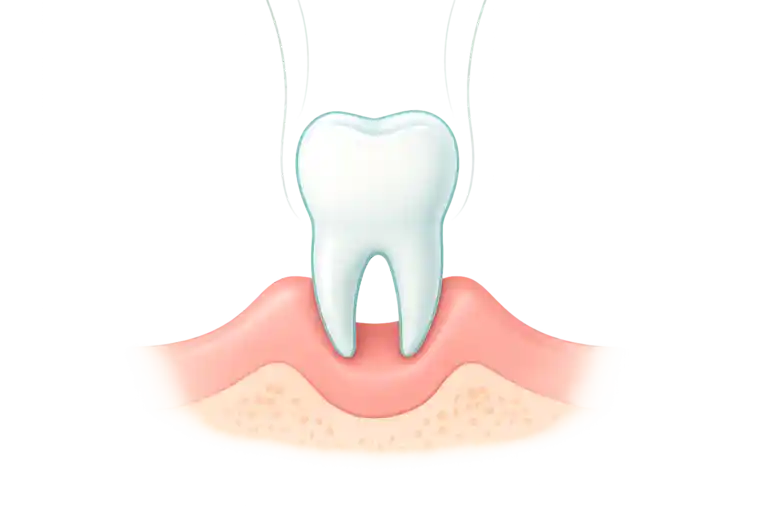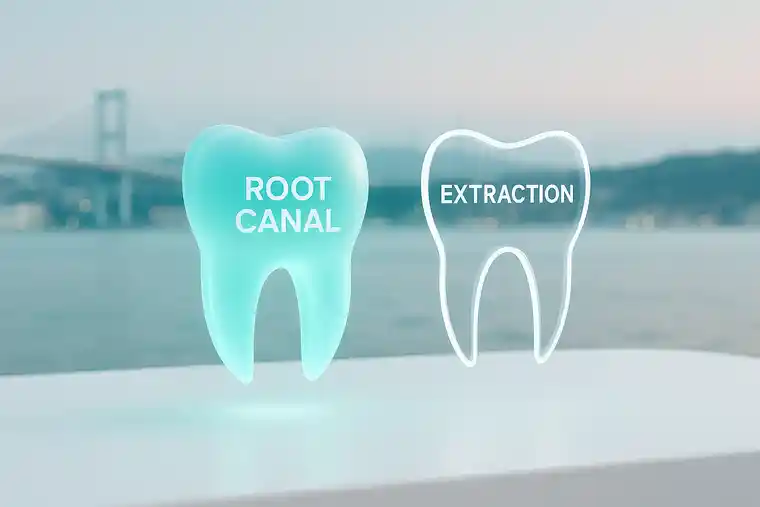Root Canal or Extraction in Istanbul, Turkey: Comparing Costs, Recovery & Results

Written by Dr. Mehmet Kalcay, Endodontic Specialist (DentSpa)
Choosing the Best Dental Solution for Your Smile in Istanbul – Root Canal or Extraction
Do you have an infected tooth? All hope is not lost.
You can get rid of the infection through a cosmetic procedure called a root canal. It stops the infection and preserves your tooth.
If the infection proves too stubborn, you can get an extraction instead. This one removes your tooth so your mouth can heal the infection.
These two procedures will take care of your tooth infection and restore your smile.
But which one should you get, and why should you choose it? This article will guide you about what a root canal and an extraction are, key differences, and how to choose which one’s best for your tooth.
Table of Contents
What Is a Root Canal?

A root canal is also called endodontic therapy. The whole idea behind it is to save your natural tooth.
Dr. Mehmet Kalcay, Endodontic Specialist at DentSpa, says: “A root canal allows you to keep the structure of your tooth while removing what’s causing the pain inside.”
Now, the way tooth infection works is this. At the centre of your teeth, there’s a soft core called the dental pulp. It has nerves and blood vessels that keep your tooth moisturized and prevent brittleness. When bacteria or decay reach that area, the tooth becomes infected, and that is when the pain starts.
How a Root Canal Works
In a root canal procedure, the dentist removes and cleans out the infected dental pulp. After, they seal it to stop further infection. A crown is then placed on top to protect it. The entire purpose is to save your natural tooth, so it can keep doing its job.
Dr. Mehmet adds, “Without the crown, the treated tooth can easily crack later”.
Most people imagine this procedure as something truly painful, but honestly, it is much smoother than a filling. You are fully numbed, and once it is finished, most of the time the relief is immediate. Afterward, for a few days, your tooth may feel tender. That’s just your body healing.
Who qualifies (or does not) for a Root Canal?
A root canal is great for people with a badly infected tooth that is still strong. If the outer part of your infected tooth is solid and the roots are healthy, you are a good candidate.
The root canal treatment might not work for everyone, though. If you have a tooth that is cracked below the gumline, root canal treatment will probably not help much. Also, if the damage is too severe, even the best root canal might not hold up long-term. In this case, you should consider getting an extraction.
Pros and Cons of a Root Canal
Pros:
- Saves your natural tooth
- Keeps your bite even and your jawbone strong
- Usually painless during the procedure because of numbing
- Quicker recovery time
- Feels and looks natural once it is healed
Cons:
- Can be more expensive upfront, especially when you add the cost of a crown
- May need more than one appointment if the infection is deep
- If bacteria are not fully removed, the infection can return
- The treated tooth can still crack if not covered with a crown
- Some people feel mild tenderness for a few days after
What Is a Tooth Extraction?

An extraction, on the other hand, entails removing the infected tooth completely from your jawbone. Tooth extraction is considered in severe cases where saving the tooth is just not possible.
This includes severe trauma, overcrowding, and where the infection has eaten deep into the bone.
Dr. Mehmet explains: “In some cases, an extraction is necessary to stop the infection from spreading”.
How an Extraction works
The first thing the dentist does is to numb the affected area. After, they loosen and remove the affected part and apply gauze to stop the bleeding. You can get a tooth extraction for visible teeth or even hidden away ones.
An extraction gets rid of the pain and the infection, but there are things to note. You have to fill the gap left by the extracted tooth. If you don’t, your other teeth may shift and affect your bite. This may imply additional costs and dental visits.
Who qualifies (or does not) for it
Extraction is great when a tooth cannot be saved. That might mean the decay has eaten too deep, the tooth is cracked beyond repair, or the infection has spread into the bone.
If you have overcrowded teeth or you’re getting a brace, you may also need to extract one or more teeth.
Dr. Mehmet clarifies: “We sometimes extract healthy teeth for orthodontic balance”.
Pros and Cons of an Extraction:
Pros:
- Quickly removes pain and infection
- Often cheaper upfront than a root canal
- Good choice when the tooth is too damaged to save
- Helps with overcrowding for people getting braces
- Once healed, you never have to worry about that tooth again
Cons:
- Leaves a gap that can make nearby teeth move slightly
- The bone in that area can shrink over time
- Healing takes longer and needs extra care
- More soreness and swelling in the first few days
- You will probably need a replacement later, like an implant or bridge
Root Canal or Extraction – Key Differences Explained
Here is the simple truth. A root canal saves your tooth. An extraction removes it.
When you choose a root canal, the infection gets rooted out. You also get to keep your natural tooth. That way, your bite stays the same.
If you choose an extraction, the infection also gets extracted. But you lose the infected teeth and leave an empty space. This empty space can cause your teeth to shift or your jawbone to shrink due to disuse. You’ll usually have to get a replacement for the removed tooth.
That said, here’s a brief comparison of the two procedures:
Comparison Table: Root Canal vs Extraction
| Feature | Root Canal | Extraction |
|---|---|---|
| Goal | Saves your natural tooth and removes infection from inside it | Removes the tooth completely to stop pain and infection |
| Pain During Treatment | Usually painless thanks to numbing | Usually painless thanks to numbing |
| Pain After Treatment | Mild soreness for a day or two | More soreness and swelling for several days |
| Time to Heal | Heals within a few days | Can take one to two weeks to fully heal |
| Cost | Higher upfront cost, especially with a crown | Lower upfront cost but replacement later can be costly |
| Effect on Appearance | Keeps your natural look and smile | Leaves a gap that may affect appearance |
| Effect on Jawbone | Keeps bone strong because the tooth root stays in place | Bone in that area can shrink over time |
| Chewing Comfort | Feels natural once healed | Chewing may feel uneven until the tooth is replaced |
| Longevity | Can last many years with good care | Tooth is gone for good, but replacement is often needed |
| Best For | Teeth that are still strong enough to be saved | Teeth that are too damaged or infected to save |
Which One Is Right for Your Tooth

Which of the procedures should you choose? It all depends on some things.
Health of Your Teeth
If your tooth structure is compromised or cracked deeply, an extraction may be your only choice. It would also be a better option if the tooth infection has spread to your jawbone. However, if your tooth is still strong and the roots are in good shape, a root canal is the way to go.
Healing and Aftercare Comparison
Root canal healing feels like recovery. Extraction healing feels like repair. Both get you back to comfort, but extraction usually needs more rest time. After a root canal, you can usually get back to normal within a day or two. You may experience mild soreness, but it goes away quickly.
For an extraction, you’ll need to exercise more patience. You’ll need to let your bone and tissue repair. You’ll also need to find a solution or replacement for the removed tooth. A failure to do this may result in issues with your bite or other teeth.
Cost Considerations
Upfront, you’ll pay more for a root canal. This is because you’re usually paying for the procedure and the cost of a crown. After this, you won’t have to pay for any follow-up treatment.
With an extraction, you’ll pay less upfront, but have to pay for subsequent treatments. These may include paying for implants or dentures. Thus, root canal, while appearing more expensive, may prove to be cheaper long term.
Consultation and Expert Advise
You should always consult an expert dentist before making a choice. Don’t just opt for a procedure because it appears cheaper or easier. Consulting a dentist will let you know what treatment is best for your situation. Your dentist will be able to determine your tooth health, the level of damage, and your gum condition.
Dr. Mehmet emphasizes: “Never make the decision based on pain alone. Two patients may feel the same ache but need completely different treatments.”
Getting It Right The First Time – Why Experience Matters
Whether you’re getting a root canal or you’re opting for an extraction, you mustn’t get it botched.
The only way to do this would be to get your surgery done by a board-certified dentist in a reputable clinic. Not only that, they should have loads of experience. That way, they’ve seen it all when it comes to root canals or extractions.
One of the best countries to get a root canal or an extraction is Turkey. In Istanbul, Turkey, one clinic, DentSpa, stands out. With more than 25 years of experience, they have helped 50,000+ patients find solutions to their dental problems.
DentSpa has been named the best dental clinic in Europe for a reason. You can rely on the vast experience of their skilled and qualified dentists.
Book a consultation with DentSpa today.
For those who are inspired by this MedClinics blog, remember that your path to a new smile is just a phone call away. Anyone interested in finding out more should contact MedClinics. There you will be in the best hands.
Get a free consultation and a no-obligation quote now!
Stay Updated
Follow our blog for the latest in medical and aesthetic treatments, tips for maintaining healthy teeth, and inspiring patient success stories.

FAQ’s regarding Root Canal or Extraction in Istanbul, Turkey
What is better for me? Root canal treatment or tooth extraction?
That depends entirely on whether the tooth can still be saved.
Normally, tooth extraction is always the last option.
Before that, attempts will be made to preserve the tooth, treat it, and restore it to health. Patients often just want to get rid of the pain and have teeth extracted that could still be saved because they are afraid of root canal treatment.
But it’s not as bad as it sounds.If you have a tooth extracted, you will be left with a gap that needs to be filled…
Your dentist will work with you to decide what is best for you.
What about the costs? What are the prices?
Tooth extraction is cheaper, at least at first glance. It is also simpler in terms of time; you go once, the tooth is extracted, and you are done.
With root canal treatment, you have to visit the dentist more often and it takes longer.But when you have a tooth extracted, you are left with a gap that you have to deal with. If you decide to have an implant, it will certainly be more expensive than root canal treatment.
How long does recovery take?
After root canal treatment, everything returns to normal after a few days. When a tooth is extracted, it is a shock to the body and it needs some time to recover.
It will try to close the gap, the gums need to heal, and after all, a real wound has been created.
Can every tooth be saved with root canal treatment, or is it simply too late for some?
It depends; unfortunately, not every tooth can be saved.
The sooner you go to the dentist, the better the treatment will be and the less pain you will experience. However, if you wait too long and the bone has already become inflamed or the root is no longer holding properly, the tooth will usually have to be extracted.
If I have a tooth extracted, what should I do afterwards? Do I need to replace it?
Yes, of course… If you don’t close the gap, your other teeth will shift because your body will try to close the gap.
You won’t be able to chew properly because your bite won’t be right.And if a front tooth has to be extracted, it doesn’t look nice anyway, so there’s no question about it, the gap must be closed…
Get your free consultation
- Need guidance and reassurance?
- Talk to a real person from MedClinics!
- Let's find the perfect doctor together.





